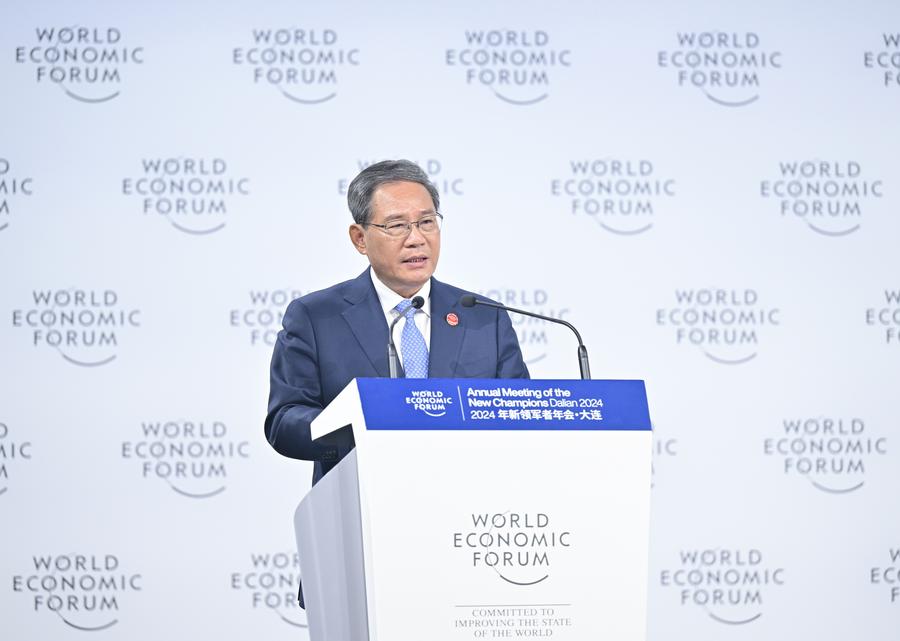Chinese premier sheds light on new pathways for global growth
 Chinese Premier Li Qiang addresses the opening plenary of the 15th Annual Meeting of the New Champions, also known as the Summer Davos, in Dalian, northeast China's Liaoning Province, June 25, 2024. (Xinhua/Li Xiang)
Chinese Premier Li Qiang addresses the opening plenary of the 15th Annual Meeting of the New Champions, also known as the Summer Davos, in Dalian, northeast China's Liaoning Province, June 25, 2024. (Xinhua/Li Xiang)
DALIAN, June 26 (Xinhua) -- Chinese Premier Li Qiang on Tuesday offered his insights on how to jointly explore new drivers and pathways for global economic growth, with the world currently threatened by challenges posed by trade protectionism and unilateralism.
The exploration of the next frontiers for growth should not be a zero-sum game but aimed at common growth for all, Li said when addressing the opening plenary of the 15th Annual Meeting of the New Champions, also known as the Summer Davos, in northeast China's coastal city of Dalian.
"The 'small yard and high fence' policy cannot stifle the development of opponents, but only shackle the hands and feet of those who favor such a policy," the premier added.
Li urged countries to create an even, fair and nondiscriminatory environment for scientific and technological innovation, developed on the basis of intellectual property rights protection.
Answering questions from Executive Chairman of the World Economic Forum Klaus Schwab, Li said that in reality, many innovative ideas find fertile ground for validation in China, where seeds of various innovations can easily find the right environment to flourish.
Over the past few years, China has strongly supported basic research and development, placed great emphasis on the development of national strategic scientific and technological strength, and vigorously promoted corporate innovation, all aiming to enhance capacity for original innovation, he said.
The country is now home to more than 400,000 high-tech enterprises, as well as over 100,000 specialized and sophisticated small and medium-sized enterprises, which produce new and unique products.
Li also stated that it is essential to fully leverage the power of the market to play a decisive role in resource allocation. "For the government, the most critical aspect is to create a favorable environment for innovation and entrepreneurship."
In his speech, Li noted that China is committed to addressing climate change and has been proactively developing green industries such as new energy.
The rapid rise of China's new industries has been in line with the global trend of technological revolution and green development, Li said.
Electric vehicles, lithium batteries and photovoltaic products produced by Chinese companies have not only met domestic demand but also enriched global market supply. This has alleviated global inflationary pressures and made a positive contribution to global efforts in addressing climate change, Li stated.
In light of this, countries and regions should fulfill their respective emission reduction responsibilities and not delay the pace of green transition for the sake of short-term economic growth, according to Li.
"The green transition itself holds immense potential for development. We should jointly promote the development of green and low-carbon industries and create more growth drivers for the green economy," he said.
Li called on all countries and regions to work closely together, oppose bloc confrontation and decoupling, maintain the stability and unimpeded flow of industrial and supply chains, and promote trade and investment liberalization and facilitation.
All countries and regions should also coordinate development and governance and optimize related laws and governance frameworks to achieve more inclusive development, Li said in his speech.
The Summer Davos, featuring the theme "Next Frontiers for Growth," runs from June 25 to 27.


